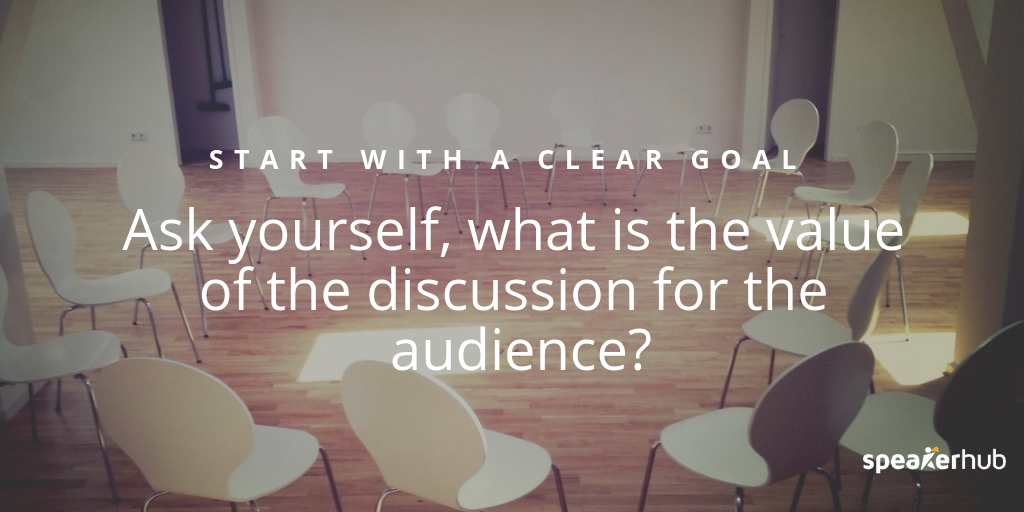6 Ideas for Moderating Engaging Panel Discussions
Discussion panels can go one of two ways. They are either enlightening and provocative, or dull and boring. Read below for tips on how to ensure your panel falls in the former category.
The audience is there to learn, and the moderator’s role is to engage both the audience and the panel by creating an engaging and educational atmosphere. So, how do you keep your panel discussion bright and lively?
6 tips on how to moderate great panel discussions
1. Start with a clear goal. Ask yourself, what is the value of the discussion for the audience? What will they get out of it? Use this as the baseline for everything you do moving forward.
Come back to this goal when you introduce the panel to the audience, are thinking of questions to ask, and addressing your panelists.

2. Recruit panelists with diverse perspectives. Set-up your panel with speakers who have varying opinions and backgrounds.
Encourage your panelists to be provocative, to disagree with each other, and share the reasons why. If everyone is in accord, the discussion will be monotonous. Playing all angles of a debate is more fun and engaging for those involved. But, watch out for those who disagree without supplying their reasoning. Simply disagreeing offers no value or movement to the discussion.
3. Prep the talk. There is a fine line between preparing your panelists and scripting them. You need to stay on the right side of that line if you want the panel to remain a free discussion. Ensure that the panelists know what your goals are and how their role helps achieve those goals. Encourage your panelists to come up with various opinions and points of view on the topic beforehand to bolster the discussion.
We once heard of a panel moderator who only gave his panelist one piece of instruction: “No silences.” It worked because it kept all the panelists on their toes, looking for areas to jump in, without the panel becoming overly-scripted or planned..

4. Get better at asking questions. Start asking questions that demand detailed responses. It is better to start simply and broadly, then as the discussion continues, narrow in on the specifics. Be certain your questions are clear to both the panelist and audience. Try to imagine what your audience would like to know, and remind yourself of how best to make this discussion valuable to them.
To build energy and foster learning, encourage the panelists to ask each other questions. This can stimulate different perspectives and change the flow of the panel in an interesting way. Just make sure that you are able to bring the discussion back on track if it strays off topic.
5. Jump In. It takes some practice to know when is the right time to jump in. How to find the balance between too much or too little control? Always refer back to the needs of your audience. Here, are a few things to keep in mind when it comes to jumping in:
- Ensure equal “airtime” for all your speakers. If you notice one of your speakers is using the panel discussion as a soapbox, it is your job to reign them in and give other panelists some time to share their perspectives
- Listen, remember, and look for opportunities to transition by summarizing the key points.
- Accentuate differences of opinion rather than highlighting areas where the panelists agree.
- Always remember that the panel is about the speakers, not the moderator. Your job is to create the show, not star in it.
6. Stay on point and on time. When you notice the conversation is going down an unhelpful tangent, catch it and steer it back on course. Discussions can get lost down very interesting rabbit holes, but you must always keep your goal in mind.
Timekeeping is an essential part of the role for a moderator. All your panelists need to know how long both the discussion and Q+A should be. Decide how you will keep track of the important time marks (i.e. halfway point, last 5 minutes, etc.) and how you will communicate them to the panel.

Things to watch out for
- Missing the objective. If the panelists are caught up talking about something that is not on-topic, it can easily irritate the audience who came specifically to hear about that topic. Keep the panel focused. Reiterate what the talk is about if you feel it is getting off track.
- Being too passive. It is your role to set up provocative questions that will polarize or spark strong opinions. Be ready to challenge your panelists, and get them fired up about sharing ideas! Keep in mind how you structure the discussion to get the ideas firing. For example, starting a panel with a Q+A rarely works because the audience needs to have ideas to respond to first. Keep up the energy and interest throughout the entire discussion. If you are bored, it is very likely your audience is too.
- Failing to intervene appropriately or timely enough. Allow one panelist to finish their idea before another panelist reacts. Don’t let panelists interrupt one another. Intervene firmly and respectfully. Never let a single panelist talk too long or become self-promoting. Speakers who dominate the discussion and answer every question get boring very quickly. When you are prepping the speakers, ensure they know that you are going to put the audience’s needs first and will intervene firmly if the discussion needs to move on.
- Stating the obvious and being too repetitive. Keep your introductions very short. All the speakers will have their information online, so it is not necessary to spend too much presentation time giving backgrounds. Your panelists should avoid being repetitive. The audience doesn’t need to hear one panelist share an idea and another panelist repeat it. If they are going to respond, it should be to add something to the idea or to disagree and explain why.
- Wasting people’s time. Audiences appreciate it when you value their time. Sometimes, you can have a more meaningful panel in 20 minutes than you can in an hour. What’s important is that innovative ideas were shared that benefited the audience. Have a clear deliverable, and get to it early on.

We would like to hear some of your advice about running panel discussions or your experiences putting some of these tips into action. Have you run into issues that are not on this list? We’d like to write about it. Contact us here.
Find out more about being listed as a moderator on SpeakerHub here.
You might also like:





